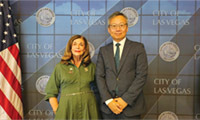The Anti-Party Men: Trump, Carson, Sanders and Corbyn
▶ David Brooks
Donald Trump didn’t even swear allegiance to his party’s eventual nominee until last week. He is a lone individual whose main cause and argument is Himself.
Ben Carson has no history in politics and a short history in the Republican Party. He is a politically unattached figure whose primary lifetime loyalty has been to the field of medicine.
Bernie Sanders is a socialist independent, who in the Senate caucuses with the Democrats.
And yet, these anti-party figures are surging in the party races for the presidential nominations.
This phenomenon is even more extreme in Britain. The British Labour Party suffered a crushing election defeat in May because people did not think its leader was strong enough, and because they thought its policy agenda was too far left.
And yet at the moment the favorite to become the next leader of the British Labour Party is Jeremy Corbyn. Mr. Corbyn has existed for decades on the leftward fringe of the Labour Party, tolerated as sort of a nice but dotty uncle.
He spent much of his career at the edge of the parliamentary party, writing columns for The Morning Star, a communist-founded newspaper. He’s a pacifist who called for British withdrawal from NATO. He’s spent his career consorting with the usual litany of anti-Western figures, including his friends in Hamas and Hezbollah. Until about three months ago he was considered the most outside of the outsiders . until a cult of personality developed around him, rocketing him to the top of the polls.
These four anti-party men have little experience in the profession of governing. They have no plausible path toward winning 50.1 percent of the vote in any national election. They have no prospect of forming a majority coalition that can enact their policies.
These sudden stars are not really about governing. They are tools for their supporters’ self-expression. They allow supporters to make a statement, demand respect or express anger or resentment. Sarah Palin was a pioneer in seeing politics not as a path to governance but as an expression of her followers’ id.
Why has this type risen so suddenly?First, political parties, like institutions across society, are accorded less respect than in decades past. But we’re also seeing the political effects of a broader culture shift, the rise of what sociologists call expressive individualism.
There has always been a tension between self and society. Americans have always wanted to remain true to individual consciousness, but they also knew they were citizens, members of a joint national project, tied to one another by bonds as deep as the bonds of marriage and community.
As much as they might differ, there was some responsibility to maintain coalitions with people unlike themselves. That meant maintaining conversations and relationships, tolerating difference, living with dialectics and working with opposites. The Democratic Party was once an illogical coalition between Northeastern progressives and Southern evangelicals. The G.O.P. was an alliance between business and the farm belt.
But in the ethos of expressive individualism, individual authenticity is the supreme value. Compromise and coalition-building is regarded as a dirty and tainted activity. People congregate in segregated cultural and ideological bubbles and convince themselves that the purest example of their type could actually win.
The young British left forms a temporary cult of personality around Jeremy Corbyn. The alienated right forms serial cults around Glenn Beck, Herman Cain, Palin, Trump and Carson.
These cults never last because there is no institutional infrastructure. But along the way the civic institutions that actually could mobilize broad coalitions . the parties . get dismissed and gutted. Without these broad coalition parties, the country is ungovernable and cynicism ratchets up even further.
Maybe this is a summer squall and voters will get interested in the more traditional party candidates come autumn, the ones who can actually win majorities and govern. But institutional decay is real, and it’s what happens in a country in which people would rather live in solipsistic bubbles than build relationships across differences.
I wonder what would happen if a sensible Donald Trump appeared . a former cabinet secretary or somebody who could express the disgust for the political system many people feel, but who instead of adding to the cycle of cynicism, channeled it into citizenship, into the notion that we are still one people, compelled by love of country to live with one another, and charged with the responsibility to make the compromises, build the coalitions, practice messy politics and sustain the institutions that throughout history have made national greatness possible.
스마터리빙
more [ 건강]
[ 건강]이제 혈관 건강도 챙기자!
[현대해운]우리 눈에 보이지 않기 때문에 혈관 건강을 챙기는 것은 결코 쉽지 않은데요. 여러분은 혈관 건강을 유지하기 위해 어떤 노력을 하시나요?
 [ 건강]
[ 건강]내 몸이 건강해지는 과일궁합
 [ 라이프]
[ 라이프]벌레야 물럿거라! 천연 해충제 만들기
 [ 건강]
[ 건강]혈압 낮추는데 좋은 식품
[현대해운]혈관 건강은 주로 노화가 진행되면서 지켜야 할 문제라고 인식되어 왔습니다. 최근 생활 패턴과 식생활의 변화로 혈관의 노화 진행이 빨라지고
사람·사람들
more
[인터뷰] 멕시코 오지에 세운 ‘희망 진료소’… “관심과 행동이 등불”
멕시코 바하 캘리포니아의 작은 마을 ‘푼타 코로넷(Punta Colonet)’. LA에서 차로 7~8시간 정도 달려야 닿는 이곳에 한인 내과의…

김영완 총영사 LV 방문
김영완 LA 총영사는 지난 11일부터 13일까지 라스베가스(LV)를 방문, 시장 및 주지사실 산하 경제개발청, UNLV 호텔경영대학 등과 잇따…
어흥축제 국악경연대회 해외 참가자 특별 무대
2025 어흥축제가 우천으로 오는 12월12일로 연기된 가운데 이번 축제의 일환으로 예정됐던 미주 국악경연대회의 해외 참가팀 특별무대 행사가 …
[올림픽 골프] 3개 남가주 매장에서 ‘원스톱 골…
올림픽 골프가 추수감사절을 맞아 대규모 골프 용품 세일을 진행한다. 이번 세일은 골프 클럽, 골프백, 의류, 액세서리 등 다양한 골프 관련 제…
[한스전자] 인기 가전제품 최대 2,000달러 할…
한스전자가 연말을 맞아 삼성, LG, 딤채, 프리지데어 등 인기 가전제품을 대상으로 최대 2,000달러 대규모 할인 행사를 진행한다. 이번 행…
많이 본 기사
- 한인 대형교회 전도사 113만불 횡령… 8
- 사우디 빈살만 “1조달러 투자”…7년… 1
- 2,000달러 관세 배당금… 내년에 … 1
- 아내 ‘냉동인간’ 만들더니 돌연 “혼자살기 적적해”…새 여친 맞은 남편 中서 논란
- 정용진, 빈살만 사우디 왕세자 美방문 환영행사 참석
- 관광비자 수수료 인상 185달러서 435달러로
- 트럼프, ‘7년만의 방미’ 사우디 빈살만에 오·만찬 ‘국빈급예우’
- 中, ‘日총리 발언 철회’ 요구에 日 거부… ‘주머니 손 中’ 영상도
- 한인 버스기사 살해범, 중범 불체자였… 1
- 조현병 나아졌다고 방치하면?… 5년 내 80% 재발 가능성 높아
- “첨단기술 노린 중국, 미국에 지난 … 1
- 한인타운 ‘우후죽순’ 노점상들 버몬트… 1
- 도요타, 미국 내 하이브리드車 생산 확대… “9억 달러 규모 투자”
- 대형유통점 홈디포 연간 실적전망 하향… “소비 경고음”
- 최현우, ‘13억’ 로또 1등 예언 적중에 고소당할 뻔..”당첨금 수령은 노코멘트”[돌싱포맨]
- 셧다운 기간인 10월 중순에도 실업지표 안정적
- 구글 피차이 “AI 버블 터지면 면역있을 회사 없어”
- 강경화 주미대사 “美와 긴밀소통해 韓… 1
- ‘강제추행 혐의’ 오영수, 대법원 간다..검찰 ‘무죄 판결’에 상고
- 클라우드플레어 장애…챗GPT·X 등 다수 한때 접속 안돼
- 구글, 차세대 AI ‘제미나이3’ 출시…검색창 전진배치해 정면승부
- 론스타와 ‘13년 국제소송전’ 마침표… ‘배상금 0원’ 완승
- ‘쯔양 협박’ 구제역, 수감 중 방송 은퇴 “피해자들에 죄송”
- ‘한채영 닮은꼴’ 28기 영숙 “반복되는 오해” 성형 시술 입 열었다
- 서예지, 가스라이팅→학폭 논란 후 복귀 준비 중..머리 산발에도 미소
- 오늘도 해결사! 이강인 환상 크로스→이태석 A매치 데뷔골 쾅! 한국, 가나에 1-0 신승 ‘포트2 보인다’
- 회장선거(뉴저지한인회) 놓고 내분사태… 1
- ‘수술→FA→48G 출전→또 FA’ 김하성, “1년 계약 가능성 높아” 새로운 시나리오 나왔다
- 김건희특검, 내일 ‘마지막 수사기간 연장’ 신청…내달 28일까지
- ‘사의표명’ 정진우 중앙지검장 “논란 속에 직 내려놔 마음아파”
- 애쉬번서 충전중인 배터리서 불…120만불 피해
- VA 페어팩스서 신종 ATM 절도범 설쳐
- 우편요금 또 오른다 내년초 최고 7.… 1
- 韓 대통령실 “UAE 150억불 방산… 1
- 사우디 빈살만 “1조달러 투자”…7년만의 방미환대 트럼프에 선물
- 오바마케어 대체 ‘트럼프케어’ 나오나
- 갑상선암, 운동과 상관없다더니…10년만에 결과 뒤집혀
- 장학생 20명 선정…장학금 총 3만불
- “워싱턴교협 50년, 다음세대에 방향 제시하는 좌표”
- 사자와 생쥐, 그리고 인간 이야기
- “75년 세대 잇는 이화의 대화합”
- OC 유일 대학 병원 ‘UCI 헬스’ 최고 수준 서비스
- ‘엡스타인 논란’에 입장 돌변 트럼프 “문건 전부 공개하자”
- H 마트, 2026년 탁상용 달력 무료 증정
- ‘네이버 플러스’호스피스 자원봉사자 31명 배출
- LA 일대 나흘간 폭우 11월 최대 강수량 기록
- LAX, 최대 공항 3위… 혼잡도 최악
- 주택 가스누출 ‘폭발’ 치노힐스서 8명 부상
- 대한은 다시 살아나는가
- [LA 지역 샤핑 명소 10] 럭서리… 1
1/5지식톡

-
 테슬라 자동차 시트커버 장착
0
테슬라 자동차 시트커버 장착
0테슬라 시트커버, 사놓고 아직 못 씌우셨죠?장착이 생각보다 쉽지 않습니다.20년 경력 전문가에게 맡기세요 — 깔끔하고 딱 맞게 장착해드립니다!장착비용:앞좌석: $40뒷좌석: $60앞·뒷좌석 …
-
 식당용 부탄가스
0
식당용 부탄가스
0식당용 부탄가스 홀세일 합니다 로스앤젤레스 다운타운 픽업 가능 안녕 하세요?강아지 & 고양이 모든 애완동물 / 반려동물 식품 & 모든 애완동물/반려동물 관련 제품들 전문적으로 홀세일/취급하는 회사 입니다 100% …
-
 ACSL 국제 컴퓨터 과학 대회, …
0
ACSL 국제 컴퓨터 과학 대회, …
0웹사이트 : www.eduspot.co.kr 카카오톡 상담하기 : https://pf.kakao.com/_BEQWxb블로그 : https://blog.naver.com/eduspotmain안녕하세요, 에듀스팟입니다…
-
 바디프렌드 안마의자 창고 리퍼브 세…
0
바디프렌드 안마의자 창고 리퍼브 세…
0거의 새제품급 리퍼브 안마의자 대방출 한다고 합니다!8월 23일(토)…24일(일) 단 이틀!특가 판매가Famille: $500 ~ $1,000Falcon: $1,500 ~ $2,500픽업 & 배송직접 픽업 가능LA…
-
 바디프렌드 안마의자 창고 리퍼브 세…
0
바디프렌드 안마의자 창고 리퍼브 세…
0거의 새제품급 리퍼브 안마의자 대방출 한다고 합니다!8월 23일(토)…24일(일) 단 이틀!특가 판매가Famille: $500 ~ $1,000Falcon: $1,500 ~ $2,500픽업 & 배송직접 픽업 가능LA…
케이타운 1번가
오피니언
 노세희 부국장대우·사회부장
노세희 부국장대우·사회부장 대한은 다시 살아나는가
 민경훈 논설위원
민경훈 논설위원사자와 생쥐, 그리고 인간 이야기
 한형석 사회부 부장대우
한형석 사회부 부장대우 한인타운 교통 인프라 개선 기대
 박영실 시인·수필가
박영실 시인·수필가 [화요칼럼] 말의 위력
 양홍주 / 한국일보 논설위원
양홍주 / 한국일보 논설위원 [지평선] 외국어 공부와 장수
 이상국
이상국 ‘도반(道伴)’
 옥세철 논설위원
옥세철 논설위원러시아제국 부활의 꿈은 멀어져만 가고…

폭발 직전의 상황인가?
 메건 매카들 워싱턴포스트 칼럼니스트 / CNN ‘GPS’ 호스트
메건 매카들 워싱턴포스트 칼럼니스트 / CNN ‘GPS’ 호스트 [메건 매카들 칼럼] 지나간 시대의 낙관주의
1/3지사별 뉴스

‘네이버 플러스’호스피스 자원봉사자 31명 배출
뉴저지 팰리세이즈팍에 위치한 비영리단체‘네이버 플러스’(Neighbor Plus·이사장 양춘길 목사)가 말기암 환자와 그 가족들을 돌보는 제4…
회장선거(뉴저지한인회) 놓고 내분사태 ‘악화일로’

“워싱턴교협 50년, 다음세대에 방향 제시하는 좌표”
“구슬이 서 말이라도 꿰어야 보배라는 말이 있다. 구슬을 꿰어 보배를 만들어 낸 편찬위원회에 감사하고, 지난 50년간 그 구슬을 만들어낸 여러…
장학생 20명 선정…장학금 총 3만불

사우디 빈살만 “1조달러 투자”…7년만의 방미환대 트럼프에 선물
사우디아라비아가 18일 대미 투자액을 기존에 발표했던 6천억 달러(약 876조원)에서 1조 달러(약 1천460조원) 규모로 상향 조정하기로 했…
방한후 美입국했다 석연찮게 구금된 한인과학자, 4개월만에 석방

오늘 하루 이 창 열지 않음 닫기 

















































.png)


댓글 안에 당신의 성숙함도 담아 주세요.
'오늘의 한마디'는 기사에 대하여 자신의 생각을 말하고 남의 생각을 들으며 서로 다양한 의견을 나누는 공간입니다. 그러나 간혹 불건전한 내용을 올리시는 분들이 계셔서 건전한 인터넷문화 정착을 위해 아래와 같은 운영원칙을 적용합니다.
자체 모니터링을 통해 아래에 해당하는 내용이 포함된 댓글이 발견되면 예고없이 삭제 조치를 하겠습니다.
불건전한 댓글을 올리거나, 이름에 비속어 및 상대방의 불쾌감을 주는 단어를 사용, 유명인 또는 특정 일반인을 사칭하는 경우 이용에 대한 차단 제재를 받을 수 있습니다. 차단될 경우, 일주일간 댓글을 달수 없게 됩니다.
명예훼손, 개인정보 유출, 욕설 등 법률에 위반되는 댓글은 관계 법령에 의거 민형사상 처벌을 받을 수 있으니 이용에 주의를 부탁드립니다.
Close
x